6 Insane True Statistics That Laugh In The Face Of Logic
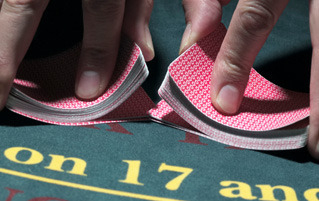
Probability rules our entire lives, but our brains absolutely suck at calculating it. The gambling industry thrives off of this fact -- tell someone they only have a 1-100,000,000 chance of winning the lottery, and they'll say, "somebody's got to win!"
We can't blame them -- there are all sorts of ways that probability works like freaking black magic. Just try to wrap your mind around the fact that ...
When You Shuffle A Deck Of Cards, You're Creating A Sequence That Has Never Existed Before

The Scenario:
Let's say you're the dealer at a casual Friday night poker game. Let's also say, for the sake of argument, that you're an expert shuffler, and not one of those people who just clumsily swirls cards around like an infant. You expertly riffle the cards, toss them hand to hand, juggle them, throw them into a hat, etc., until eventually you're confident that you've fully randomized the cards.
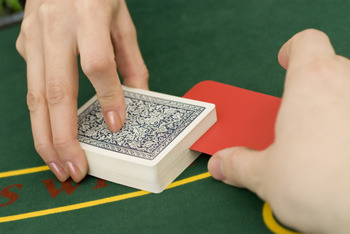
But be sure to placate the one asshole who insists on cutting the deck.
What are the chances that the configuration of the deck you now hold is the same as one that you've shuffled before on a previous poker night? One chance in 1,000? One in 10,000? We mean, there's only 52 cards, so how many can it really be?
The Reality:
You should feel special, because it's almost certain that the configuration of the deck you hold in your hand has never been held by any human being in the history of mankind, on this Earth, or on any one of its many parallel universes. You currently hold in your hand something that will never again be seen, from now until the end of time itself.
It's true that 52 cards doesn't seem like a lot. But if you try to count the number of possible combinations of those cards, you better have a few evenings free. The total number of statistical combinations of a 52-card deck is what's known as "52 factorial," sometimes referred to as "52!" or "52 shriek." Written out in full, that number is:
80,658,175,170,943,878,571,660,636,856,403,766,975,289,505,440,883,277,824,000,000,000,000

Fine, matholes. Maybe 52! is a little easier to write.
That's a giant-ass number. To put into into perspective, it's been calculated that "if every star in our galaxy had a trillion planets, each with a trillion people living on them, and each of these people has a trillion packs of cards and somehow they manage to make unique shuffles 1,000 times per second, and they'd been doing that since the Big Bang, they'd only just now be starting to repeat shuffles."
If that hurts your brain, think of it this way: There are only 52 cards, but there are only half that many letters in the English alphabet. Think about all of the different books that have been written just by mixing those same letters around. There has to be like, dozens.
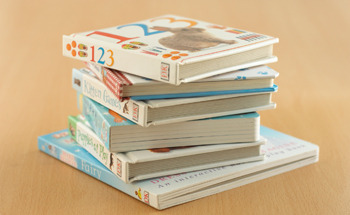
But only a couple that really matter.
Pi Can Be Calculated By Randomly Dropping A Bunch Of Paper Clips

The Scenario:
Let's play a quick game. All it takes is a piece of paper, a pencil, and a handful of paper clips (or needles, or nails, anything like that).
Draw two parallel lines on the paper, approximately two paper clip lengths apart. Now go ahead and drop a handful of paper clips on the space between the lines. It doesn't matter how many paper clips you use, but the more the better, so feel free to go hog wild.
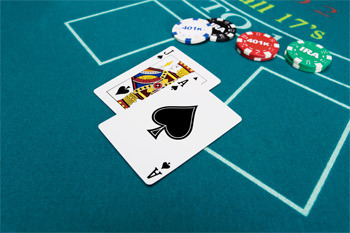
And if you can tell how many are on the paper just by looking, stop reading and get your ass to Vegas.
Take the total number of paper clips, multiply it by two, then divide that number by the number of needles that are touching one of the lines. So if you drop 20 paper clips, 13 of them are laying across one of the lines, you'd divide 40 by 13. The number you wind up with will be close to pi ... and if you up the number of paper clips, it will get closer and closer.
Like, sorcery close.

Which led to the lesser-known Salem nerd trials of colonial times.
The Reality:
Yeah, pi is one of those mysterious things that just keeps popping up in the universe, like Q from Star Trek. In this case, assuming that the position of the paper clips you dropped is completely random, all of their angles and locations will tend to even out. In much the same way that coin flips will tend to even out toward an equal number of heads and tails, even though each individual flip result is random.
Like coin flips, the result gets more accurate the more you do it, as sheer persistence irons out statistical aberrations. While your coin flips get closer to 50-50 the more times you flip, your paper clips get closer to pi the more times you drop. If you don't have the time or the paper clips to do it yourself, there are online simulations that will do it for you, because of course there are.

"Hey Mom ... yeah, they have me doing a really important project at work."
The exercise is so accurate that it's one of the methods supercomputers use to calculate pi to the billions of decimal places, which is a surprise, considering we really thought supercomputers would do actual math instead of throwing virtual office supplies all over the place.
You Can Rig A Game Of Coin Flips Just By Going Second

The Scenario:
Let's say that someone challenges you to a game of coin toss. The rules are simple -- each of you predicts a sequence of three tosses, either heads or tails. Then you toss the coin until one of your sequences comes up. If his sequence comes up first, you give him $20. If yours comes up first, he gives you $20 (note: You have time to do this because you are both unemployed).

Oh, you need welfare so bad but you still have a coin for flipping?!
If you're both playing fair, it seems like this is about as close to a 50-50 shot at winning as you can get, right? It's basically just a guessing game -- there's no way this eccentric stranger could be tricking you.
The Reality:
Even if there's no trick coin, mirrors, or wires involved, and the chances of each flip are exactly 50-50, you can still rig a game of coin toss. That eccentric stranger has as much as an 87 percent chance of beating you, and the secret is to go second.

Uh, just be careful which eccentric stranger you do this with.
Say the person who makes the first call chooses heads, heads, and tails. The trick for the second player is to remember two steps:
1. Your first call should be the opposite of their second call. In this case, tails.
2. Your second two calls should be the same as their first two calls. In this case, heads, heads.

Go ahead and make a flow chart if you need to. We'll wait.
If you follow these rules, your odds of winning will always be higher, sometimes marginally and sometimes massively. If you don't believe us, try it yourself and see how often your second series of guesses comes before your first.
This is what's known as a "nontransitive game." That is, every choice you can make is either better than or worse than any other possible choice. It's basically the same thing as a game of Rock, Paper, Scissors, only in this case, by going first, you're telling your opponent whether you choose rock, paper, or scissors before he makes his choice. So don't go first. By following the aforementioned rules, you can almost always fix it so that your choice winds up being a counter pick to his -- the rock to his scissors. Unless of course his sequence comes up on the first three flips, in which case he may be a witch.

Which is good news for our Salem readers who don't have money to pay off the bet!
The Probability That a Man's Sibling Is Also A Male is One in Three (Not 50-50)

The Scenario:
You meet this guy named, let's say his name is Chad, because he isn't here to tell you otherwise. Chad tells you that he has one sibling, but he won't tell you anything else about this mystery person because Chad is a fucking weirdo who likes to speak to people in riddles.
What are the chances that Chad's sibling is a brother? It's got to be a 50-50 chance, right? The fact that Chad is male can't possibly have any impact on the sex of his sibling.
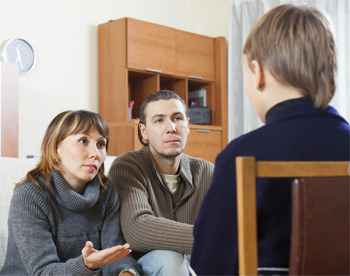
Although the fact that Chad is Chad has a definite impact on whether his parents ever want to make his sibling.
The Reality:
Actually, if Chad is male, the chances that he has a brother drop to one in three, even though the chances of his sibling being born a boy are still one in two. "But you're just rewording the sentence!" you scream, punching Chad in his stupid face. Welcome to the insane, Dali-esque world of mathematical probability.

Salvador or Lama. Doesn't really matter.
You see, we know that Chad is male, but not whether he's older or younger than his sibling. You also know there are four possible gender combinations for two children, depending on the order in which they burst from the womb: Boy/boy, boy/girl, girl/boy, girl/girl. Each combination has exactly a 1-4 chance.
But wait! You also know that Chad is male, eliminating the possibility of a girl/girl combination. So we're left with boy/girl, girl/boy, or boy/boy. And two out of three options mean he has a sister, leaving only a 1-3 chance he has a brother.

But a 100 percent chance that Chad is a huge disappointment to his parents.
We've talked before about a similar paradox called the Monty Hall Problem. In short, you have three doors -- there's a new car behind one door, but a goat behind the other two (it is unclear whether you get to take the goat home). You pick one of the doors, but instead of revealing your prize, there's a person who tells you which of the remaining two doors has a goat. Even though you now have two doors to choose from and seemingly a 50-50 chance, there's still only a 1-3 chance that you picked the right door, because those odds never changed. It's the same thing with Chad's sister -- even though it seems like he could have either a brother or a sister, he could actually have a brother, a sister, or a sister. Or a goat, we guess.
The Odds Of Two People Sharing A Birthday In A Small Group Is Almost A Certainty

The Scenario:
Let's say you're out at some party with a bunch of people you've never met before, because your friend said the party was going to be awesome and that it was totally fine if you tagged along. While you stand uncomfortably by the Cheez Doodles waiting for an earthquake or something to give you an excuse to leave, an attractive partygoer sidles up next to you and happens to casually mention that today is their birthday.
"No way!" you say. "Today is my birthday too! What are the odds of that?"

"You like the Star Wars prequels? I like the- you know what? I don't need to get laid that bad."
The Reality:
Provided you aren't lying to try to trick this person into having sex with you, the odds are so high that it's a near certainty. Specifically, the chances that in a group of just 23 people that two people share a birthday are about 50 percent.
As we've mentioned in the critically acclaimed Cracked podcast, the confusion for most people is pretty simple: Since there are 366 possible days in a year (counting leap year) and only 23 people, it seems like there'd only be about a 1-15 chance of anyone sharing a birthday. But that's true if you're talking about the odds of anyone sharing your birthday. But we're talking about any two people.

Wipe that look off your face, Leap Dayers, nobody cares how rare your birthday is.
It's not cute when you say, "I'm only eight!" either.
So when you meet one other person, the odds of them sharing your birthday are in fact one chance in 366. When you meet another person, the odds of them sharing your birthday are also one in 366. But to calculate the odds of any two of you sharing a birthday with each other, you have to multiply all your odds together, which comes out as only one chance in 122. As you add more people, the odds that every single one of you has a unique birthday shrinks much faster than you would assume -- 10 people have a 10 percent chance of a matching birthday, while 20 people have a 40 percent chance.
If that still sounds like wizardry, you can browse around the Internet for lists of 20 or so random people -- like baseball rosters. On that list of 25 Mets players, there are actually two pairs who share birthdays. And you know the team just gets them one cake every year. "This is for both of you! See, it has both of your names on it!" Fuck you, you cheap bastards!

But what really sucks is that their birthdays fall on December 26th.
Probability Dictates That "Miracles" Are Routine

The Scenario:
Now let's take the example in the above entry and scale it up.
For example, we've written a bunch of articles about amazing coincidences -- events that really occurred despite having such an incredibly low probability that it actually sends a chill up your spine. Take for example one of our favorite true coincidences -- in 1974, a 17-year-old kid was killed by a taxi while driving his moped in Bermuda. Almost exactly one year later, his brother was killed driving the same moped, on the same street, by the same taxi, carrying the same passenger. Cue The X-Files theme.

And start your r/Conspiracy thread.
The Reality:
It's impossible to calculate the odds of something like the above because you can't quantify every single variable (i.e. how often that passenger took a cab down that street, how often the brothers rode down the same street, how many other vehicles encountered them, etc.). But you can calculate something like the lottery, because there we have definite numbers we can look at.
So, what are the chances of you winning a lottery jackpot twice? Put away your notepad, we'll just tell you -- it's about one in enough trillions that you should probably begin working on a solid "Plan B" to pay off your student loans. But do a Google search for people who have won the lottery twice, and you'll get dozens of results. It's due to the same logic as the birthday thing above: Although the chances of it happening to any one specific person are infinitesimal, the chances of it happening to someone are just about certain. Our whole difficulty in understanding the odds of things like this is we assume we're the center of the universe. When we ask, "What are the odds?" we're really asking, "What are the odds of this happening to me?

"Not everything is fucking about you." --The Universe
A couple of statisticians did an experiment in which they invited people to share their own one-in-a-trillion coincidences, and calculated how unlikely they actually were. The result? Miracles turned out to be even more mundane than they expected.
When one woman reported having won the lottery twice in a four-month period, they calculated that the odds of that happening to that specific woman were one in 17 trillion. On an individual scale, she's the luckiest woman on the planet. However, the chances of anyone at all winning the lottery twice in four months were closer to one in 30. Basically, it's pretty much a guarantee that someone is going to become impossibly wealthy two times over before the end of this year.
It just isn't going to happen to you.

But we're sure that moped is just fine.
Josh can be seen performing stand-up at various hives of scum and villainy in New York City. Follow him on Twitter, and check out him and his roommates on YouTube. Federico loves writing about science and math. You can ask him anything about it by contacting him here.
For more on probability (for better or worse), check out 7 People Who Cheated Death (Then Kicked It In The Balls) and The 7 Most Bizarrely Unlucky People Who Ever Lived.
Nightmarish villains with superhuman enhancements. An all-seeing social network that tracks your every move. A young woman from the trailer park and her very smelly cat. Futuristic Violence and Fancy Suits, a new novel about futuristic shit, by David Wong.

